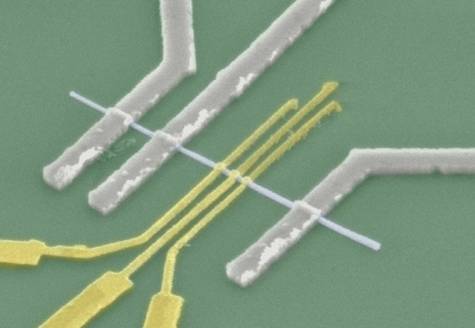 Overview
Overview
Each year, about 30-40 students start their studies within our MSc in Physics programme. As a MSc student here, you will have the chance to acquire specialized knowledge within the following areas: (i) fundamental physics research, including theory as well as experiment, (ii) applied physics, with the focus on materials science and applied optics, (iii) nuclear technology, and (iv) medical physics. Directions (i) and (ii) are coordinated by the Institute of Physics, whereas (iii) and (iv) by the Institute of Nuclear Techniques. The two major components of the programme are the courses (mainly lectures and lab courses), and the research activity leading to the MSc thesis. Your first year will be dominated by the courses, whereas the MSc thesis work will be carried out during the second, third and fourth semesters. The research during your MSc studies could already lead to scientific publications in recognized international journals, helping you in starting your academic career. To conclude your MSc studies at the end of the second year, you will take a final exam, and submit and defend your MSc thesis.
For more information on the admission procedures and tuition fees, please visit the pages of the Office of International Education of BME.
Financial support: Students from certain countries can apply for tuition-free education, a monthly stipend, a contribution to accommodation costs, and medical insurance, via the Stipendium Hungaricum Scholarship Programme.
Teaching
The academic year in Hungary starts in September and it is broken into two semesters: Fall semester and Spring semester. Both semesters start with a registration week, which is followed by a teaching period, and the semester is concluded with an exam period.
Fall semester:
Registration week: early September
Teaching period: from early September till mid-December
Exam period: from mid-December till end of January
Spring semester:
Registration week: early February
Teaching period: from early February till mid-May
Exam period: from mid-May till end of June
Within the teaching period, physics MSc students attend lectures and laboratory courses. For the lectures, the evaluation of the students' performance is usually based on an oral or written exam taken in the exam period. Homework assignments might also contribute to the evaluation. Laboratory courses often involve a preliminary test before each experiment. The measurement and the subsequent data evaluation is usually caried out in a collaborative fashion, by pairs of students. Each experiment is concluded by submitting a written report; these serve as the basis for grading.
The MSc programme can be completed in two years, that is, in four semesters. At the end of the last semester, students submit and defend their MSc thesis, and take a comprehensive exam covering the most important parts of their MSc studies.
The courses
You will find the list of courses of the MSc specializations under the following links:
- Full course list in alphabetic order
- Nanotechnology and Materials Science
- Optics and Photonics
- Research Physicist
- Nuclear Technology
- Medical Physics (the language of the specialization is Hungarian)

